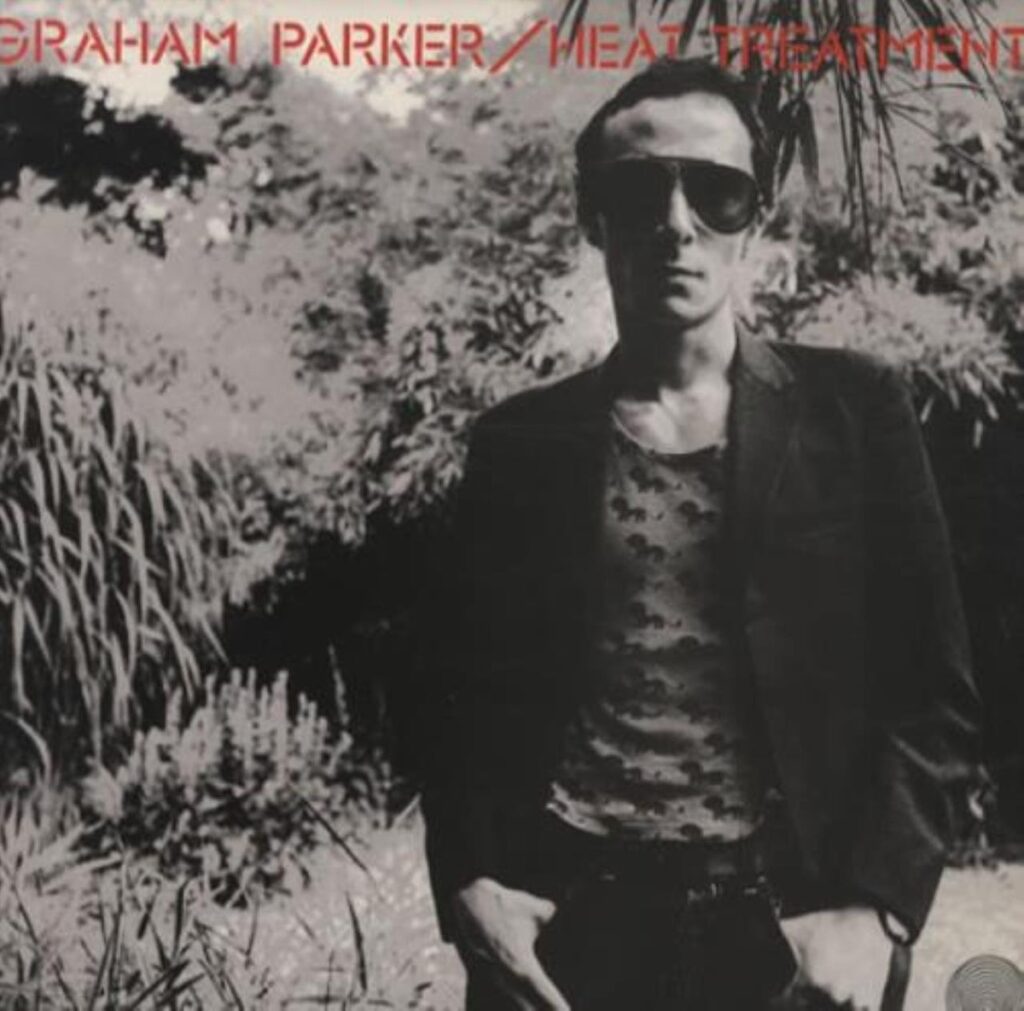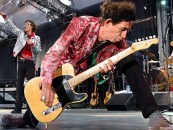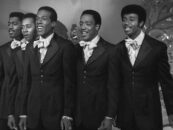Graham Parker & the Rumour’s ‘Heat Treatment’: When Pub-Rock Met New Wave
by Sam Sutherland When the Village Voice unveiled its 1976 Pazz & Jop Poll winners, an unknown English rookie commanded two of the top five entries calculated from the influential poll’s panel of music critics. Right behind Stevie Wonder’s magisterial poll-topper, Songs in the Key of Life, came Graham Parker’s sophomore full-length Heat Treatment, followed by Jackson Browne’s The Pretender, with Parker’s debut, Howlin’ Wind, landing in fourth place.
When the Village Voice unveiled its 1976 Pazz & Jop Poll winners, an unknown English rookie commanded two of the top five entries calculated from the influential poll’s panel of music critics. Right behind Stevie Wonder’s magisterial poll-topper, Songs in the Key of Life, came Graham Parker’s sophomore full-length Heat Treatment, followed by Jackson Browne’s The Pretender, with Parker’s debut, Howlin’ Wind, landing in fourth place.
Parker’s one-two punch harkened back to the ’60s when artists dropped new records at a feverish pace. His April debut was followed in October by an equally infectious sequel, with the crack band behind him crucial to both. Rightly elevated to co-billing on Heat Treatment, the Rumour was manned by five pub-rock alums seasoned during the U.K.’s early ’70s rebellion against prog-rock bloat and glam-rock glitz. Honing their craft in the local pubs that gave the movement its name, the quintet brought chops to spare when it closed ranks around Parker.
A relative late bloomer, Graham Parker grew up in East London’s Hackney borough and left school at 16 for a succession of unrelated jobs: an animal research firm in Surrey, picking tomatoes and digging ditches in Guernsey in the Channel Islands, working in a rubber glove factory in Sussex. A baby boomer who had swooned to British Invasion bands and American soul music, Parker picked up his first guitar at 18, practicing and playing as he hitchhiked across Europe from Paris, then on to Spain, Morocco and Gibraltar, where he worked on the docks by day and played in bars, testing his first original songs and linking up with Pegasus, a psychedelic band he nudged beyond minor-keyed hippie cliches by teaching them soul standards.
By late 1972, when he returned to England for good, Parker seriously committed to a music career. Living with his parents and working in a petrol station, he focused on playing and songwriting for two years before placing an ad in Melody Maker seeking backing musicians, a query that eventually led him to manager Dave Robinson, whose connections included a small studio operating above the Hope and Anchor, the Islington pub that was a pub-rock mainstage. There, Parker cut a demo version of “Between You and Me” that would wind up intact on Howlin’ Wind.
More consequential was Robinson’s history shepherding Brinsley Schwarz, named for its lead guitarist and notable for bassist, songwriter and singer Nick Lowe. The band’s evolution from the softer pop of Kippington Lodge into the smart roots-rock it plied as Brinsley Schwarz met with checkered commercial results but cast a significant influence over its pub rock and new wave successors.
With Robinson wrangling a contract with Mercury Records, Lowe, Schwarz and keyboard player Bob Andrews proved vital allies in Parker’s ascendance. Lowe, who had paid attention while Dave Edmunds helmed production on the Brinsleys’ final album, 1975’s New Favourites, stepped up to produce Howlin’ Wind, while Schwarz and Andrews founded the Rumour with veterans from two other pub-rock groups, guitarist Martin Belmont from Ducks Deluxe and the rhythm section of bassist Andrew Bodnar and drummer Stephen Goulding from Bontemps Roulez. A five-man horn section stood ready to fortify the arrangements with exuberant charts that fleshed out the overall sound with the scale of a road-tested R&B show band.
The chemistry between Parker and the Rumour was immediately apparent, saluted by critics and fans, stoking demand for a sequel, but their manager’s ambitions flipped the script. Robinson joined forces with fellow manager Jake Riviera to launch Stiff Records, drafting Lowe as first artist and inhouse producer, spawning a pathfinding indie that forged pub-rock bona fides as a prime mover for punk and new wave. The roster would include Ian Dury, the Damned, Wreckless Eric, Lene Lovich and Elvis Costello, whose first five albums would be produced by “Basher” Lowe, who completed just one track for the second Parker LP before jumping into the maelstrom of Stiff’s cheeky onslaught.
Production was reassigned to Robert John “Mutt” Lange, a South African émigré beginning his career shepherding sessions for other Mercury acts. Lange, who would later notch hits for the Boomtown Rats, AC/DC, Def Leppard and the Cars, among others, left Parker and the Rumour’s overall ensemble sound intact, opening the new set with an all-hands-on-deck arrangement of the title song.
“Heat Treatment” flexes the collective firepower of the Rumour and its auxiliary Rumour Horns, saxophonists John Earlier and Albie Donnelly, trombonist Danny Ellis and trumpeter Dick Hanson. The song itself is lyrically slight but infectious, designed more to move feet than strike poetic sparks with an exuberant swagger that taps into a soulful vein shared by Van Morrison’s ’70s bands and Asbury Park’s E Street Band and Asbury Jukes, while the Rumour’s core ensemble sustains the influence of the Band, which had inspired Brinsley Schwarz to rewire their own style by the early ’70s. Guitarist Schwarz emulated Robbie Robertson, eschewing effects in favor of concise fills and spidery solos, while Andrews wove keyboard dialogues between piano and organ.
That parallel emerges more clearly on “That’s What They All Say,” which strips down to the core quintet on a cheerfully cynical putdown of its self-centered subject. The leaner but lively framework backlights Parker’s tough, worldly lyrics and caustic stance that runs throughout his work, delivered by the frontman in a raspy sneer. The relative classicism of his songs’ harmonic palette and song structure pins his style to earlier rock and R&B but the vitriol that often ripples beneath his lyrics nods toward punk without succumbing to its rawness.
Scarred love songs prevail here to establish a baseline of romantic skepticism threading through “Turned Up Too Late,” which dials back the heat and the tempo while escalating from scorn to outright rejection, its time-sensitive frustration revealed as revenge for being turned down before. From there, Parker descends to unalloyed heartbreak, rendering “Black Honey” as a brooding ballad paced as a funeral march. The delicate ripple of Schwarz’s electric guitar arpeggios and Andrews’ acoustic piano accents are spare, set against the latter’s legato organ orchestration, giving a clear path for Parker’s anguished vocal, supplanting the earlier songs’ cynicism with abject despair.
Parker and his comrades don’t let that pessimistic cluster of songs sap momentum from the overall set, closing out the LP’s first side with “Hotel Chambermaid,” a strutting rocker that evokes the Stones’ and Faces’ horndog crowd-pleasers with its winking, generic erotic wordplay. However welcome its energy, the track is rendered more palate cleanser than future classic by side two’s terrific opener, “Pourin’ It All Out,” one of Heat Treatment’s high points.
The lyrics are deceptively raw as Parker brings us to a “wild December night,” lashed by rain and standing on a lover’s doorstep as he struggles to manage surging emotions evoked by the simmering tension between Schwarz’s stinging guitar figures and Andrews’ coiled organ chords. “Sometimes I feel like pourin’ it all out,” Parker confesses, the title choruses conveying release as a familiar conflation of emotional need and sexual desire.
Heat Treatment may have finished higher with Pazz & Jop’s voters, but there’s room to consider All Music Guide’s assertion that “Mutt” Lange might have added more polish than Parker or the Rumour needed. Lowe’s lone production here, “Back Door Love,” doesn’t offer sufficient evidence to contest that charge, especially in the likely event that Lange oversaw the final mix, but it’s worth noting that the track is a charmer, carrying an affectionate whiff of pop nostalgia in the Rumour’s backing street-corner chorus of “wah-ooohs,” coloring a jaunty valentine to a clandestine lover enlivened by Parker’s fanboy lyrics:
“Hey, when you touch me, baby, my treble sounds a little louder,
My bass booms a lot brighter, my rhythm rocks a little tighter…”
Binding its erotic metaphor to sonic bliss is on brand with Lowe’s own discography, peppered as it is with affection for music itself.
Parker reverts to romantic combat on “Something You’re Goin’ Thru,’” a sleek uptempo showcase for the full band. The rhythm section tees up a lite reggae pulse, teased with darting electric guitar, another organ and piano conversation by Andrews, and swinging horn choruses from the Rumour horns that achieve a satisfying liftoff.
Revisiting the double dip into Parker’s earliest songs, it’s fair to reconsider whether their impact was as much quantitative as qualitative, heightened by the collective impact of 22 songs spread across two LPs released just months apart. His writing would only deepen in the years that followed, sharpening the contrast with early efforts that wore his influences more openly. Happily, for Graham Parker and his fans, his partnership with the Rumour rendered both early classics and workmanlike tracks to maximum effect, with Heat Treatment saving his best for last.
“Fool’s Gold” constructs a satisfying soul workout around its sly, central metaphor for romantic fulfillment, launched by Parker with a winking backward glance to adolescence. Rippling piano, organ and a sinuous guitar figure provide a stately fanfare before the front man’s entry, chronicling his search for the perfect partner, even as he undercuts the prize with his very title. “I been doing my homework now, for a long, long time,” he reports in a matter-of-fact tone that will shortly give way to urgent vocal flourishes—repeated phrases, then open vowels that serve as exclamation points to the singer’s agony and ecstasy as he “keep(s) on searching for that fool’s gold,” answered by his band’s vocal counterpoint as the arrangement builds toward its full-throated coda with the ebullient interplay between the Rumour’s core quintet and its four horn players.
Parker’s single degree of separation from Schwarz and Robinson placed him at pub-rock’s crossroads with new wave’s emerging clutch of stylized artists, arriving 15 months before the new wave benchmark of Elvis Costello’s My Aim is True, with Heat Treatment following a year before the Sex Pistols’ self-immolating punk manifesto, Never Mind the Bollocks… Out of the gate, Graham Parker and the Rumour were clearly beneficiaries of their days down the pub, but the twin albums’ frank classicism and the band’s musicianship elevated them toward mainstream rock.
Watch Graham Parker and the Rumour perform “Heat Treatment” live in 1977
The critical esteem Parker and the band earned that year wasn’t matched by commercial success, with the debut set seeing negligible sales and its October 1976 sequel making modest inroads to the U.K. and U.S. album charts. The sextet held together through two more Mercury albums, one live, before achieving its most successful collaboration with Squeezing Out Sparks, with Parker and the Rumour steering left toward a harder, more modern attack, shorn of horns. The final Parker/Rumour full-length, The Up Escalator, was tracked in the wake of Andrews’ departure from the band, replaced by Nicky Hopkins, the E Street Band’s Danny Federici and Peter White of Quiver.
Related: Our Album Rewind of Squeezing Out Sparks
Parker’s solo career has since described a journeyman’s path marked by a substantial discography, somewhere north of 25 studio albums, including a few nominal band projects and his warmly received reunion with the Rumour on record and screen under the auspices of Judd Apatow. After their first split from Parker, the Rumour reunited with Andrews to cut a trio of albums before disbanding in 1980.
[Parker’s extensive catalog is available in the U.S. here and in the U.K. here.]
BONUS AUDIO: Listen to the Rumour on their own performing “Mess With Love,” written by Nick Lowe, the lead-off track from their first album on their own, Max (a winking nod to that year’s massive Fleetwood Mac long player, Rumours), produced by Robert “Mutt” Lange.







No Comments so far
Jump into a conversationNo Comments Yet!
You can be the one to start a conversation.